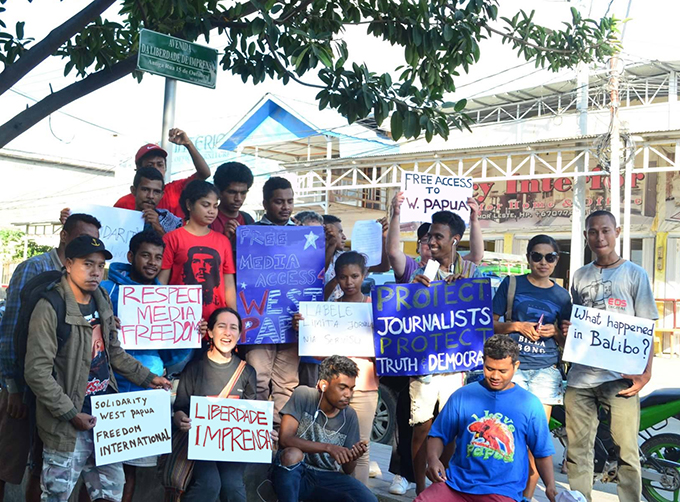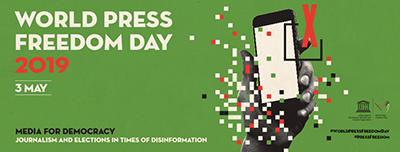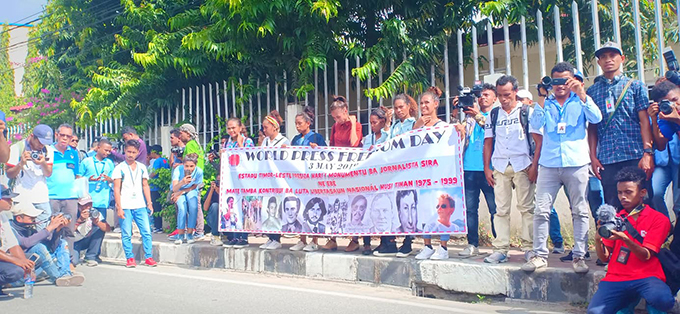
COMMENT: By Bob Howarth in Dili
Today, World Press Freedom Day, is being celebrated in all democratic parts of the world. And Timor-Leste has much to celebrate.
First, how did I become so involved in Timor’s media and why do I keep coming back? This is my 34th trip. My first trip was in February 2000 when we launched the Timor Post with equipment, computers, printers and laptops supplied by my then employer Queensland Newspapers in Brisbane.
At the time, I was editorial technology manager and had just had finished a major disaster planning project for the arrival of the year 2000, better known as Y2K, or the “Millennium Bug”. Some remember that we thought then that planes would fall out of the sky and computers would crash because they had two-digit year dates – and not four digits like now.

I got a phone call from a friend at the University of Queensland to come and meet 12 Timorese journalists who had flown to Brisbane to attend a special course on “post-conflict reporting.” It was about how irresponsible, biased journalism can cause violence and even wars.
Many of those veteran journalists are here today.
Their reaction to the course was: it was very good but we have nothing to go home to produce news – no presses, no computers everything was destroyed in the 1999 violence after the vote for independence.
My company had all these surplus supplies which were non-Y2K complaint but they still worked properly. So a couple a days later the 12 journalists flew out to Darwin and with them they had 12 PCs, seven laptops, two laser printers and a heap of A4 paper to set up the Timor Post.
Photocopy machine edition
I flew to Dili a few days later when the equipment arrived and we worked for 30 hours straight to produce on February 29 the first edition of the Timor Post – and we printed it on a high-speed photocopy machine.
Since then Timor-Leste has developed one of the most vibrant media establishments with five daily newspapers (which no country anywhere near this size has) as well as good TV coverage and importantly very wide community radio coverage in every district.
At this point, I should give credit also to the many donors to helped develop Timor-Leste’s media and journalism standards through various projects. These include UNDP, AusAID, USAid, Jika, Norway, the EU, different journalism bodies and unions.
Also, in my opinion as a former director of the Papua New Guinea Press Council, possibly the best press council, now only three years old also but making great progress in training and support for the industry.
What your press council is teaching are the very basics of good reporting: the who, what, when, where and why questions that every story should cover. Balance and fairness is absolutely important.
When a reporter writes a story he or she should ask themselves: Have I given both sides of the story? Does my political or religious belief influence the way I report? Is it fair?
Since coming to Timor-Leste regularly I read and heard some reports of the case of an expatriate priest in Oecussi being accused of child sex offences over a long period. He currently is facing trial so no opinion should be made during the court proceedings.
Culture or respect?
But I wondered why such an issue was not big news? Is it culture or respect for those in positions of trust?
However, on a happier subject, let me return to press freedom in Timor-Leste. The country should be very proud because it has gone from zero – nothing in 1999 – in its press freedom to the highest RSF ranking in Asia at number 84 in the world. This is up a record 11 places on 2018.
Some people ask how is this RSF ranking done every year?
Well, I can tell you as I helped organise four years ago six independent people in each of the three countries I cover to answer comprehensive surveys about the media operations and press freedom issues in their country. Some are journalists or academics. Some are NGOs or lawyers but no politicians.
They answer basic questions like how many journalists have been killed, injured, assaulted, threatened, jailed and so on. How diverse is your media and ownership?
Currently Australia is not looking good as media companies merge and literally dozens of journalists have been losing their jobs as newsrooms merge and there are very few openings for the hundreds of journalism graduates all over the country. But not the case in Timor-Leste.
Timor-Leste’s biggest challenge is competition for advertising dollars which is so necessary to pay wages and printing costs.
Internet statistics
And like much of the world it is easy to see why online journalism is growing rapidly. Timor-Leste has, according to the latest internet statistics, some 410,000 people able to read online.
It has become the big threat to traditional media with instant access and much cheaper production costs.
This brings me to two subjects that I am very passionate about: Facebook and Google Translate.
Why? Well fake news on Facebook and other social media has become a global problem. Currently Facebook has been blocked in Sri Lanka after the terrible massacre of innocent Christians there to stop further violence erupting from provocative hate posts there.
Next week, Papua New Guinea, a country where I lived and worked for four years, is putting 1000 extra police on duty in the capital of Port Moresby during a vote of no confidence against Prime Minister Peter O’Neill in their national Parliament. Fake news and hate speech is widespread in that country and tensions are high.
New Zealand’s media are setting an example for the rest of the world as a result of the Christchurch mosque killings in March. They have all agreed to focus reporting on the massacre victims and not the white supremacist currently facing justice.
Today I am proud to say, the Timor-Leste Press Council is launching a campaign to lobby Google and Facebook to add Tetum to the list of languages they can translate automatically to other languages.
Tetum translations
I have been using Bahasa Indonesia Translate for years with my many Indonesian friends and I regularly use Portuguese Translate to read news stories about Timor on Lusa. I need Tetum translate and Timorese need it so they can read material, including for education, on the internet in English, French, Chinese or German.
Currently Google makes billions of dollars profit. It has Icelandic Translate! Anybody know where Iceland is? A tiny country near Norway with a total population about same number of internet users in Timor-Leste!
And as they say, it’s not rocket science as there are two Tetum dictionaries already online which can be adapted with the right development for these platforms.
Once this is done it will be much easier then for any interested person who cannot speak or read Tetum to follow your new – and possibly expose fake news.
This brings me to another topic: Fake news checking. We all know that the internet has a lot of fake news for political purposes or for fraud or stirring up religious or racial hatred. Facebook says it has 15,000 monitors around the world who respond to users to report various instances of graphic violence or hate speech to be taken down. But who reads complaints in Tetum?
I have personally reported violence on Facebook posted in Timor-Leste. They were videos of young girls punching and kicking each other in the street. I don’t know why people would like this violence. Both videos I reported were taken down.
This brings me back to my theme for this talk: Developing and protecting democracy through ethical journalism. You can all help, your government can help in this campaign to add Tetum to Google and Facebook translation options.
Viva Timor-Leste!
Bob Howarth is country correspondent for Reporters Sans Frontieres/Reporters Without Borders (Paris) for Timor-Leste, Papua New Guinea and Solomon Islands. He is also media training consultant to UNDP Timor-Leste and Consuelo de Impreza TL. This address was given during Timor-Leste’s media freedom festivities in Dili today.










































